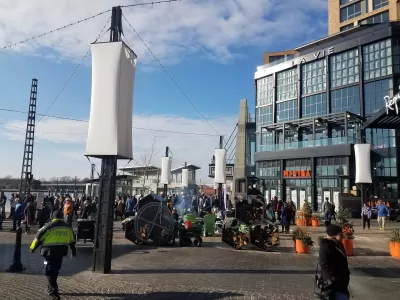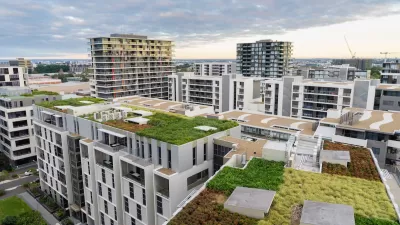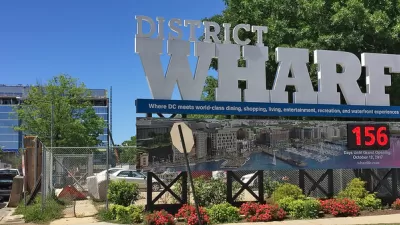Subtle design interventions can facilitate safe navigation in urban environments for people with cognitive abilities effected by dementia.

Washington, D.C. is one of many cities with a growing population of older adults. "31% of the region’s population growth between now and 2045 will comprise people over the age of 65. Among these hundreds of thousands of people, up to a quarter will have dementia and other memory loss at some point in their lives," writes Jonathan Paul Katz.
Many lives could be improved by prioritizing design interventions that make urban spaces more usable for people with dementia, says Katz. Contrary to popular belief, the word dementia describes a range of conditions and experiences related to cognitive decline. Kats further asserts that people with dementia, however, can age in their communities rather than in an institutional situation.
Katz' article describes the difficulties faced by people with dementia in navigating an urban environment: "Skills that we take for granted are difficult for older adults with dementia, including the ability to find alternative routes, filter out extraneous sensory information, or remember directions."
Katz wants people wracking their brains to invent helpful design interventions to know that "walkable urban design and dementia-friendly design are often one and the same. There are also specific interventions that can make public spaces easier for people with dementia, including wayfinding, sensory and generational variation, and special attention to sitting areas and surfaces."
Read Katz' article to learn about a case study of The Wharf in Washington, D.C., in which designers provided sensory cues to help people affected by dementia navigate during their visit.
FULL STORY: Good urban design can make Greater Washington more dementia-friendly

Planetizen Federal Action Tracker
A weekly monitor of how Trump’s orders and actions are impacting planners and planning in America.

Map: Where Senate Republicans Want to Sell Your Public Lands
For public land advocates, the Senate Republicans’ proposal to sell millions of acres of public land in the West is “the biggest fight of their careers.”

Restaurant Patios Were a Pandemic Win — Why Were They so Hard to Keep?
Social distancing requirements and changes in travel patterns prompted cities to pilot new uses for street and sidewalk space. Then it got complicated.

Albuquerque Route 66 Motels Become Affordable Housing
A $4 million city fund is incentivizing developers to breathe new life into derelict midcentury motels.

DC Area County Eliminates Bus Fares
Montgomery County joins a growing trend of making transit free.

Platform Pilsner: Vancouver Transit Agency Releases... a Beer?
TransLink will receive a portion of every sale of the four-pack.
Urban Design for Planners 1: Software Tools
This six-course series explores essential urban design concepts using open source software and equips planners with the tools they need to participate fully in the urban design process.
Planning for Universal Design
Learn the tools for implementing Universal Design in planning regulations.
Heyer Gruel & Associates PA
JM Goldson LLC
Custer County Colorado
City of Camden Redevelopment Agency
City of Astoria
Transportation Research & Education Center (TREC) at Portland State University
Camden Redevelopment Agency
City of Claremont
Municipality of Princeton (NJ)




























